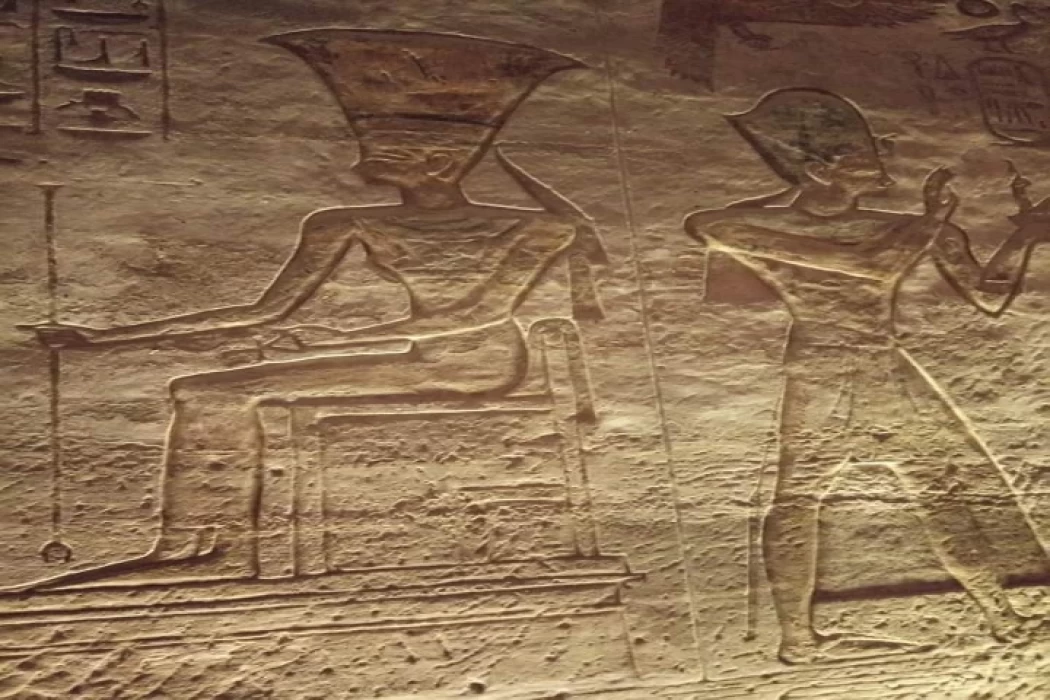
Diosa Anuket
Anuket (o Anukis, su nombre griego) es una diosa nubia, representada como una dama con una corona de plumas o juncos, con un cetro y el conocido anj de la cultura del Antiguo Egipto. Su nombre significa "la que abraza", y era venerada en Sehel y Elefantina.
Cerca de la primera catarata del río Nilo, a partir del Imperio Medio, se la veneraba junto a sus padres, Khnum y Satis, formando una tríada sagrada: la tríada de Elefantina. Antes, sin embargo, se la consideraba hija del dios Amón Ra.
El animal que la representaba era la gacela, que simbolizaba la delicadeza y la ternura. En este aspecto, se la mostraba como la "madre del rey", amamantando al faraón como una figura maternal y protectora.
Se la conocía como la "soberana de Nubia". Se la consideraba la diosa de la lujuria, ya que al estar asociada al Nilo, representaba la fertilización de la tierra por las inundaciones cuando el río se desbordaba.
Con el paso del tiempo y el encuentro de diferentes culturas, se la identificó con la diosa Isis en Dendera y File e incluso se la relacionó con Neftis más tarde.
El principal centro de culto de Anukis, tal y como lo conocemos hoy en día, era el templo de la isla de Sehel, aunque se la veneraba en toda Nubia, en Elefantina, File, Komir, Dendera y Deir el-Medina.
Cada año, la fiesta dedicada a ella tenía lugar el séptimo día del mes del dios Thoth. Era el momento que coincidía con la crecida del río Nilo. En estas fiestas, era costumbre que la gente dejara como ofrenda oro, joyas y objetos preciosos, que se arrojaban al agua en agradecimiento por la fertilidad de los campos.
Parte de la costumbre incluía la gastronomía. En estos días, era posible comer ciertos tipos de pescado que estaban prohibidos durante el resto del año.
Elige tu trío de los Tours de Lujo en Egipto y únete a una aventura encantadora en la gran historia egipcia.
Anuket (or Anukis, her Greek name) is a Nubian goddess, represented as a lady with a crown of feathers or reeds, with a scepter, and the well-known ankh of Ancient Egyptian culture. Her name means "she who embraces", and she was venerated in Sehel and Elephantine.
The animal that represented her was the gazelle, which symbolized delicacy and tenderness. In this aspect, she was shown as the "mother of the king", suckling the pharaoh as a maternal and protective figure.
She was known as the "ruler of Nubia". She was considered the goddess of lust, because being associated with the Nile, she represented the fertilization of the land by flooding when the river overflowed.
The main center of worship of Anukis, as we know it to this day, was the temple on the island of Sehel, although she was venerated throughout Nubia, in Elephantine, File, Komir, Dendera, and Deir el-Medina.
Every year, the feast dedicated to her took place on the 7th day of the month of God Thoth. It was the moment that coincided with the flooding of the Nile River. In these festivities, it was customary for people to leave as an offering gold, jewels, and precious objects, which were thrown into the water in gratitude for the fertility of the fields.
Part of the custom included gastronomy. On these days, it was possible to eat certain types of fish that were forbidden during the rest of the year.
Religious rituals began with the Ankut festival, when the annual Nile floods began. People threw coins, gold, jewelry, and precious gifts into the river, crediting the water with giving life and the benefits of returning the wealth provided by its fertility to the goddess Ankut. Taboos held in several regions of Egypt against the consumption of certain fish, which were considered sacred, were lifted during this period, indicating that Nile fish species were idolized and used as part of major religious festival rituals.
Anuket's Triad at Elephantine
Like her mother, Satet, Anuket was considered the goddess of hunting animals. According to mythology, Anuket was part of the Elephantine Triad.
The ram-headed fertility deity Khnum, the battle goddess Satet from the Nile flood, and their daughter Anuket, the cataract goddess, made up this triad. Elephantine is situated near Aswan, Upper Egypt, which is on the border between Egypt and Nubia. It was a place of worship for the gods named above. There are other Nile arches in Nubia, which is now Sudan.
When the Nile flooded, the waters entered Egypt via Elephantine. History tells us that Anuket's father, Khnum, guarded and controlled the river's waters... By the 18th century, this place had become a center of worship for the three deities.
















